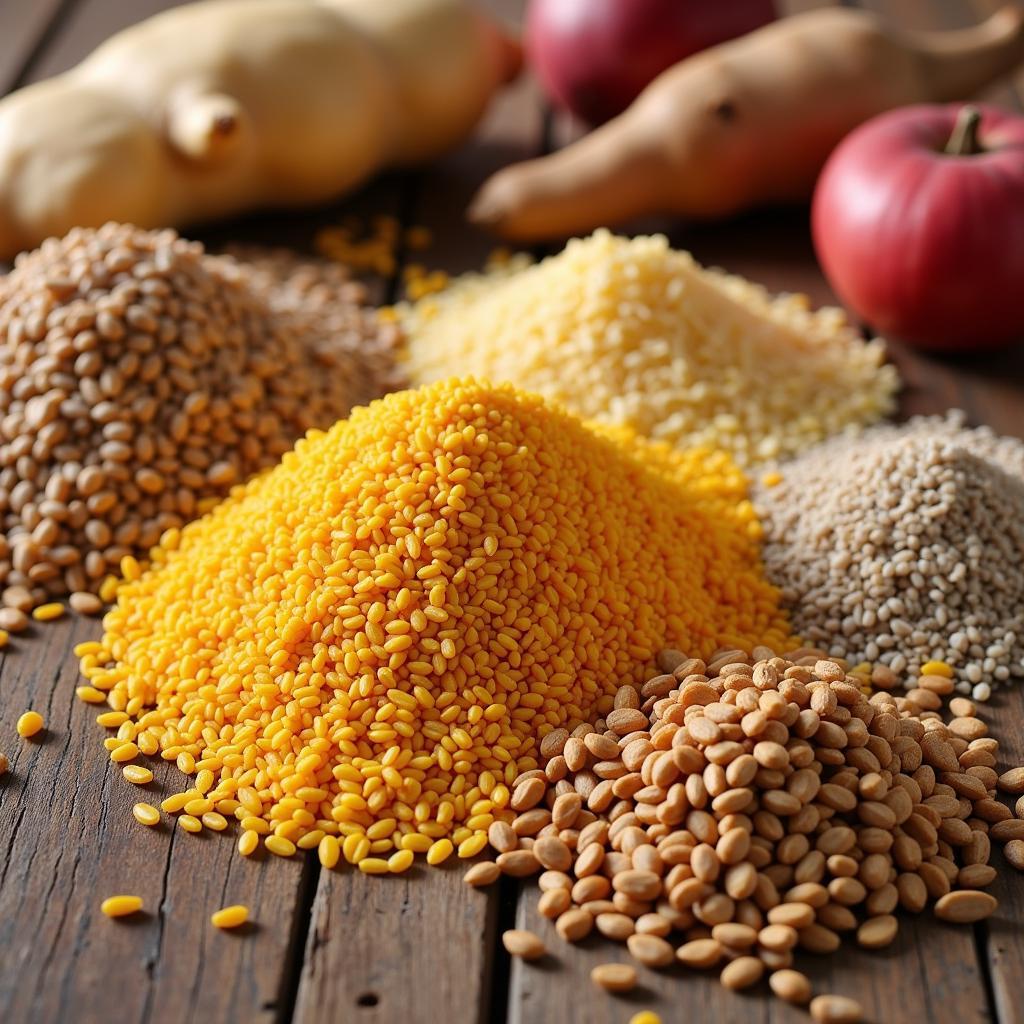Exploring the Diverse World of African Ingredients
From the sun-kissed plains of the Serengeti to the bustling markets of Marrakech, Africa offers a treasure trove of unique and flavorful ingredients. This article delves into the rich diversity of African Ingredients, exploring their culinary uses, cultural significance, and potential health benefits. Let’s embark on a culinary journey across this vibrant continent and uncover the secrets behind its delicious and diverse cuisine.
Staple African Ingredients: A Culinary Foundation
Many African ingredients have become staples in dishes across the continent, shaping the unique flavors and textures of various regional cuisines. Cassava, a starchy root vegetable, is a primary source of carbohydrates in many African countries. It’s incredibly versatile and can be boiled, fried, or ground into flour. Similarly, millet and sorghum, drought-resistant grains, are crucial in drier regions, providing sustenance and forming the base of many traditional porridges and breads. Plantains, a type of banana, offer a slightly sweet and starchy flavor, often enjoyed fried, boiled, or roasted.
 A collection of staple African grains and root vegetables
A collection of staple African grains and root vegetables
Unveiling the Spices of Africa
African cuisine is renowned for its bold and aromatic flavors, largely due to the skillful use of spices. From the fragrant warmth of Ethiopian berbere to the fiery kick of North African harissa, spices play a vital role in enhancing the taste and complexity of African dishes. These spices not only contribute to the distinctive flavors of African cuisine but also hold cultural and historical significance. For instance, certain spices are used in traditional ceremonies and remedies, reflecting the deep connection between food and culture in Africa. african food ingredients offer a fantastic insight into the range of ingredients used in the continent’s diverse cuisine.
What are some commonly used spices in African cooking? Many dishes feature ginger, cumin, coriander, and cinnamon, lending their unique aromatic notes to create rich and flavorful meals.
From Bush to Bowl: Indigenous African Ingredients
Beyond the staples, Africa boasts a wealth of indigenous ingredients, many of which are only now gaining global recognition. Moringa, often referred to as the “miracle tree,” is packed with nutrients and used in various dishes, from soups and stews to teas and powders. Baobab fruit, with its tangy and citrusy flavor, is rich in vitamin C and antioxidants. These indigenous ingredients not only provide nutritional benefits but also offer a glimpse into the unique culinary traditions of different African communities. african black ant pill uses ingredients benefits side effects provides a more specific look at a traditional remedy and its components. Understanding the origins and uses of these ingredients deepens our appreciation for the diverse culinary landscape of Africa.
“Indigenous African ingredients are not just food; they are a connection to our heritage and a celebration of our biodiversity,” shares Dr. Anika Nkrumah, a renowned ethnobotanist specializing in African flora.
African Ingredients in Modern Cuisine
Today, chefs worldwide are increasingly incorporating African ingredients into their creations, introducing exciting new flavors and textures to global palates. From baobab smoothies to moringa-infused salads, these ingredients are finding their way into innovative dishes, showcasing the versatility and potential of African cuisine. african beauty ingredients showcases how some of these ingredients are also used in traditional beauty practices across the continent.
How are African ingredients impacting the global culinary scene? They are adding a unique dimension to modern cuisine, pushing boundaries and introducing new flavor profiles that excite and inspire.
African Ingredients: A World of Flavor Awaits
African ingredients offer a vibrant tapestry of flavors and textures, reflecting the continent’s rich cultural heritage and biodiversity. From the familiar staples to the exotic indigenous ingredients, there’s a world of culinary exploration waiting to be discovered. Embracing these ingredients not only enriches our culinary experiences but also fosters a deeper understanding and appreciation for the diverse cultures of Africa. So, embark on a culinary adventure and let the flavors of Africa inspire your next meal!
Are you interested in exploring the potential health benefits of African ingredients? Many of these ingredients are packed with nutrients and antioxidants, offering potential benefits for overall well-being. You can find further information in our article on african black ant male enhancement ingredients. You can also read about the fascinating combination of traditional and modern ingredients in african black soap and tea tree oil shampoo ingredients.
FAQ
- What are some popular African grains? Millet, sorghum, and fonio are popular grains used in various African dishes.
- Where can I find African ingredients? Specialty grocery stores, online retailers, and local African markets are good places to find African ingredients.
- What is the significance of spices in African cuisine? Spices add flavor, aroma, and often hold cultural and medicinal significance.
- Are African ingredients expensive? Prices vary depending on the ingredient and its availability.
- Can I grow African ingredients in my garden? Some African ingredients, like moringa, can be grown in suitable climates.
- What are some traditional African dishes to try? Jollof rice, fufu, and tagine are just a few examples of delicious African dishes.
- How can I incorporate African ingredients into my everyday cooking? Start by experimenting with spices and incorporating ingredients like plantains or cassava into your meals.
“African cuisine is a celebration of life, community, and the bounty of our land. Every ingredient tells a story,” says Chef Kwame Mensah, a celebrated chef specializing in modern African cuisine.
Need more assistance? Contact us! Phone: +255768904061, Email: [email protected]. Visit us: Mbarali DC Mawindi, Kangaga, Tanzania. We have a 24/7 customer support team.

